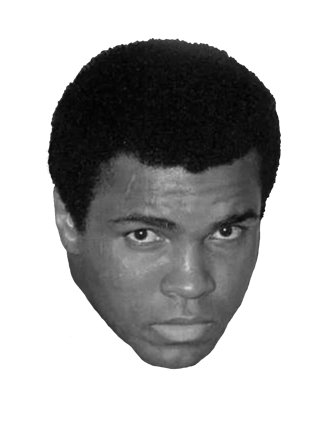


























Ali
began training at 12 years old and at the age of 22 won the world
heavyweight championship in 1964 from Sonny Liston in a stunning upset.
Shortly After that bout, ali joined the Nation of Islam and changed
his name. He converted to Sunni Islam in 1975.
In 1967, three
years after winning the heavyweight title, Ali refused to be conscripted
into the U.S. military, citing his religious beliefs and oposition
to American involvement in the Vietnam War. He was eventually arrested
and found guilty on draft evasion charges and stripped of his boxing
title. He did not fight again for nearly four years, losing a time
of peak performance in an athlete's career. Ali's appeal worked its
way up to the U.S. Supreme Court, where in 1971 his conviction was
overturned. Ali's actions as a conscientious objector to the war made
him an icon for the larger counterculture generation.
Ali
remains the only three-time lineal world heavyweight champion; he
won the title in 1964, 1974, and 1978. Between Fibruary 25, 1964 and
September 19, 1964 Muhammad Ali reigned as the undisputed heavyweight
boxing champion.
Nicknamed "The Greatest", Ali was involved
in several historic boxing matches. Notable among these were the first
Liston fight, three with rival Joe Frazier, and one with George Foreman,
where he regained titles he had been stripped of seven years earlier.
At
a time when most fighters let their managers do the talking, Ali,
inspired by professional wrestler "Gorgeous" George Wagner, thrived
in and indeed craved the spotlight, where he was often provocative
and outlandish. He controlled most press conferences and interviews,
and spoke freely about issues unrelated to boxing. He transformed
the role and image of the African American athlete in America by his
embrace of racial pride and his willingness to antagonize the white
establishment in doing so. In the words of writer Joyce Carol Oates,
he was one of the few athletes in any sport to "define the terms of
his public reputation".
Early life and amateur career
Cassius
Marcellus Clay Jr. was born on January 17, 1942, in Louisville, Kentucky.
He had a sister and four brothers. He was named for his father, Cassius
Marcellus Clay Sr., who himself was named in honor of the 19th century
Republican politician and staunch abolitionist, Cassius Marcellus
Clay, also from the state of Kentucky. Clay's father's paternal grandparents
were John Clay and Sallie Anne Clay; Clay's sister Eva claimed that
Sallie was a native of Madagascar. He was a descendant of slaves of
the antebellum South, and was predominantly of African descent, with
Irish and English heritage. His father painted billboards and signs,
and his mother, Odessa O'Grady Clay, was a domestic helper. Although
Cassius Sr. was a Methodist, he allowed Odessa to bring up both Cassius
Jr. and his younger brother rudolph "Rudy" Clay (later renamed Rahman
Ali) as Baptists. Cassius Jr. attended Central High School in Louisville.
Clay
grew up amid racial segregation. His mother recalled one occasion
where he was denied a drink of water at a store, " They wouldn't give
him one because of his color. That really affected him." He was also
affected by the 1955 murder of Emmett Till, which led to young Clay
and a friend taking out their frustration by vandalizing a local rail
yard.







